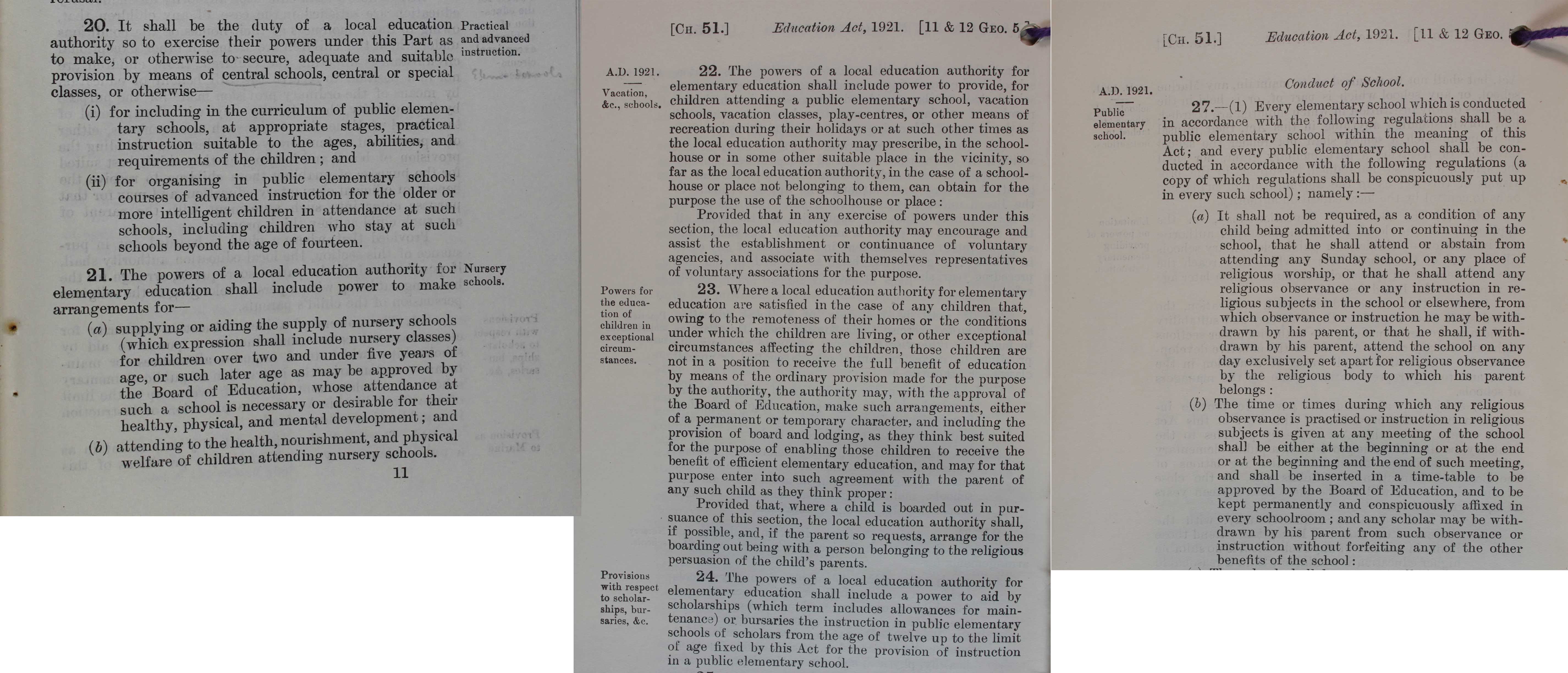
Extracts from the Education Act, 1921 covering school leaving age; nursery education; vacation education; scholarships; religious education. (Catalogue ref: RG 48/560)
Transcript
Practical and advanced instruction
- It shall be the duty of a local education authority so to exercise their powers under this Part as to make, or otherwise to secure, adequate and suitable provision by means of central schools, central or special classes, or otherwise—
(i) for including in the curriculum of public elementary schools, at appropriate stages, practical instruction suitable to the ages, abilities, and requirements of the children; and
(ii) for organising in public elementary schools courses of advanced instruction for the older or more intelligent children in attendance at such schools, including children who stay at schools beyond the age of fourteen.
Nursery schools
- The powers of a local education authority for elementary education shall include power to make arrangements for—
(a) supplying or aiding the supply of nursery schools (which expression shall
include nursery classes) for children over two and under five years of age, or such later age as may be approved by the Board of Education, whose attendance at such a school is necessary or desirable for their healthy, physical, and mental development; and
(b) attending to the health, nourishment, and physical welfare of children attending nursery schools.
A.D. 1921. Vacation &c., schools
- The powers of a local education authority for elementary education shall include power to provide, for children attending a public elementary school, vacation schools, vacation classes, play-centres, or other means of recreation during their holidays or at such other times as the local education authority may prescribe, in the schoolhouse or in some other suitable place in the vicinity, so far as the local education authority, in the case of a schoolhouse not belonging to them , can obtain for the purpose the use of the schoolhouse or place:
Provided that in any exercise of powers under this section, the local authority may encourage and assist the establishment or continuance of voluntary agencies, and associate with themselves representatives of voluntary associations for the purpose.
Powers for the education of children in exceptional circumstances.
- Where a local education authority for the elementary education are satisfied in the case of any children that, owing to the remoteness of their homes or the conditions under which the children are living, or other exceptional circumstances affecting the children, those children are not in a position to receive the full benefit of education by means of the ordinary provision made for the purpose by the authority, the authority may, with approval of the Board of education, make such arrangements, either of a permanent or temporary character, and including the provision of board and lodging, as they think best suited for enabling those children to receive the benefit of efficient elementary education, and may for that purpose enter into such agreement with the parent of any such child as they think proper:
Provided that, where a child is boarded out in pursuance of this section, the local authority shall, if possible, and, if the parent so requests, arrange for the boarding out being with a person belonging to the religious persuasion of the parents.
Provisions with respect to scholarships, bursaries, &c.
- The powers of a local education authority for elementary education shall include a power to aid by scholarships (which term includes allowances for maintenance) or bursaries the instruction in public elementary schools of scholars from the age of twelve up to the limit of age fixed by this Act for the provision of instruction in a public elementary school
Conduct of School
A.D.1921. Public Elementary School
27.—(1) Every elementary school which is conducted in accordance with the following regulations shall be a public elementary school within the meaning of this Act; and every public elementary school shall be conducted in accordance with the following regulations (a copy of which regulations shall be conspicuously put up in every school); namely:–
(a) It shall not be required, as a condition of any child being admitted into or continuing in the school, that he shall attend or abstain from attending Sunday School, or any place of religious worship, or that he shall attend any religious observance or any instruction in religious subjects in the school or elsewhere from which observance or instruction he may be withdrawn by his parent, attend the school on any day exclusively set apart for religious observance by the religious body to which his parent belongs:
(b) The time or times during which any religious observance is practised or instruction in religious subjects is given at any meeting of the school shall either be at the beginning or at the end or at the beginning and the end of such a meeting, and shall be inserted in time-table to be approved by the Board of Education, and to be kept permanently and conspicuously affixed in every schoolroom; and any scholar may be withdrawn by his parent from such an observance or instruction without forfeiting any of the other benefits of the school..
